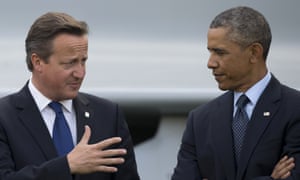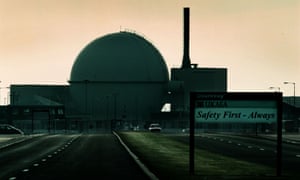Thursday 31 March
Source Link
Britain and the US will stage a war-game later this year, simulating a cyber attack on a nuclear power plant, to test the readiness of the government and utility firms.
 As David Cameron prepares to fly to Washington to attend a nuclear security summit, convened by Barack Obama, government sources said the two countries plan to cooperate on exploring the resilience of nuclear infrastructure to a terrorist attack.
As David Cameron prepares to fly to Washington to attend a nuclear security summit, convened by Barack Obama, government sources said the two countries plan to cooperate on exploring the resilience of nuclear infrastructure to a terrorist attack.
Government sources said the exercise was not triggered by any credible intelligence about the threat of such an attack, but that it was “prudent planning,” adding: “It gives us the ability to test these systems, and make sure that we learn any lessons.”
The approach will echo a similar exercise last year, which tested how the major banks could withstand a cyber-security attack.
Separately, Cameron is also set to announce an exchange deal with the US, which will see the UK ship 700kg (110st) of nuclear waste, most of it currently stored at Dounreay, in Scotland, to be processed in America.
In return, the US will send supplies of a different type of uranium to Euratom, the European nuclear agency, to be turned into medical isotopes, that can then be used in diagnosing and treating cancer across Europe.

The stories you need to read, in one handy email
Read more
Government sources described the swap as a “landmark deal,” adding: “it’s a win-win: we get rid of waste, and we get back something that helps us to fight cancer”.
They said by working together in this way, Washington, London and Brussels hope to set an example to other states of the innovative measures that may need to be taken to deal with nuclear waste products in future.
“It’s an opportunity for the UK, the US and Europe who show how countries can work together to deal with nuclear waste. It’s an opportunity for us to show some leadership to the rest of the world”, the source said.
The nuclear security summit, the fourth and final one held during Obama’s presidency, is aimed at enhancing the safety of domestic nuclear systems — something the US president first discussed in a speech in Prague in 2009, and which he sees as part of his legacy.
FacebookTwitterPinterest Nuclear research site in Dounreay, currently housing most of the waste material to be exchanged with the US. Photograph: Murdo MacLeod for the Guardian
Since the first summit in Washington in 2010, the states attending have agreed to reduce their stockpiles of potentially dangerous highly enriched uranium – the by-product of nuclear power generation – and strengthened the role of watchdog the International Atomic Energy Agency (IAEA).
Advertisement
Over that time, 14 countries have committed to removing nuclear materials from their territory altogether, and many others have pledged to step up security and tackle nuclear smuggling, by stepping up checks at ports, for example.
But in a statement setting out its hopes for this week’s meeting, the White House said there was more to do. “We all need to do more together to enhance nuclear security performance, to dissuade and apprehend nuclear traffickers, to eliminate excess nuclear weapons and material, to avoid production of materials we cannot use, to make sure our facilities can repel the full range of threats we have already seen in our neighbourhoods, to share experiences and best practices, and to do so in ways that are visible to friends, neighbours, and rivals – and thereby provide assurance that we are effectively executing our sovereign responsibility,” it said.
During the summit, the UK will offer to share its expertise on tackling cyber-crime with other countries. Japan, Korea, Turkey and Argentina have already said they would like to cooperate with the UK on this.
Cameron will also commit to spend £10bn this year to fund the world of agencies including the IAEA, on improving the security of civil nuclear infrastructure worldwide.
Over lunch on Friday, the world leaders will discuss “scenario-planning” for protecting their nuclear facilities, and preventing volatile nuclear materials falling into the wrong hands.
While the main focus is civil security, he will also receive an update on progress in implementing the Iran nuclear deal, which was signed in January, and aimed at preventing Tehran acquiring nuclear weapons, in exchange for the lifting of punitive sanctions.
While in Washington, Cameron will also hold a series of bilateral meetings with other world leaders. However, the government sources said he would not be meeting with potential candidates for the US presidency.
Britain and the US will stage a war-game later this year, simulating a cyber attack on a nuclear power plant, to test the readiness of the government and utility firms.
 As David Cameron prepares to fly to Washington to attend a nuclear security summit, convened by Barack Obama, government sources said the two countries plan to cooperate on exploring the resilience of nuclear infrastructure to a terrorist attack.
As David Cameron prepares to fly to Washington to attend a nuclear security summit, convened by Barack Obama, government sources said the two countries plan to cooperate on exploring the resilience of nuclear infrastructure to a terrorist attack.Government sources said the exercise was not triggered by any credible intelligence about the threat of such an attack, but that it was “prudent planning,” adding: “It gives us the ability to test these systems, and make sure that we learn any lessons.”
The approach will echo a similar exercise last year, which tested how the major banks could withstand a cyber-security attack.
Separately, Cameron is also set to announce an exchange deal with the US, which will see the UK ship 700kg (110st) of nuclear waste, most of it currently stored at Dounreay, in Scotland, to be processed in America.
In return, the US will send supplies of a different type of uranium to Euratom, the European nuclear agency, to be turned into medical isotopes, that can then be used in diagnosing and treating cancer across Europe.

The stories you need to read, in one handy email
Read more
Government sources described the swap as a “landmark deal,” adding: “it’s a win-win: we get rid of waste, and we get back something that helps us to fight cancer”.
They said by working together in this way, Washington, London and Brussels hope to set an example to other states of the innovative measures that may need to be taken to deal with nuclear waste products in future.
“It’s an opportunity for the UK, the US and Europe who show how countries can work together to deal with nuclear waste. It’s an opportunity for us to show some leadership to the rest of the world”, the source said.
The nuclear security summit, the fourth and final one held during Obama’s presidency, is aimed at enhancing the safety of domestic nuclear systems — something the US president first discussed in a speech in Prague in 2009, and which he sees as part of his legacy.

FacebookTwitterPinterest Nuclear research site in Dounreay, currently housing most of the waste material to be exchanged with the US. Photograph: Murdo MacLeod for the Guardian
Since the first summit in Washington in 2010, the states attending have agreed to reduce their stockpiles of potentially dangerous highly enriched uranium – the by-product of nuclear power generation – and strengthened the role of watchdog the International Atomic Energy Agency (IAEA).
Advertisement
Over that time, 14 countries have committed to removing nuclear materials from their territory altogether, and many others have pledged to step up security and tackle nuclear smuggling, by stepping up checks at ports, for example.
But in a statement setting out its hopes for this week’s meeting, the White House said there was more to do. “We all need to do more together to enhance nuclear security performance, to dissuade and apprehend nuclear traffickers, to eliminate excess nuclear weapons and material, to avoid production of materials we cannot use, to make sure our facilities can repel the full range of threats we have already seen in our neighbourhoods, to share experiences and best practices, and to do so in ways that are visible to friends, neighbours, and rivals – and thereby provide assurance that we are effectively executing our sovereign responsibility,” it said.
During the summit, the UK will offer to share its expertise on tackling cyber-crime with other countries. Japan, Korea, Turkey and Argentina have already said they would like to cooperate with the UK on this.
Cameron will also commit to spend £10bn this year to fund the world of agencies including the IAEA, on improving the security of civil nuclear infrastructure worldwide.
Over lunch on Friday, the world leaders will discuss “scenario-planning” for protecting their nuclear facilities, and preventing volatile nuclear materials falling into the wrong hands.
While the main focus is civil security, he will also receive an update on progress in implementing the Iran nuclear deal, which was signed in January, and aimed at preventing Tehran acquiring nuclear weapons, in exchange for the lifting of punitive sanctions.
While in Washington, Cameron will also hold a series of bilateral meetings with other world leaders. However, the government sources said he would not be meeting with potential candidates for the US presidency.
No comments:
Post a Comment